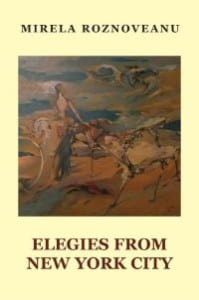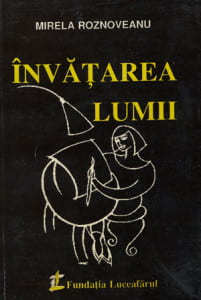William James Austin: “Mirela Roznoveanu’s poetry is “innovative” where it counts, I think — the imagery is really stunning. I can’t imagine anyone with any sensitivity reading her work, and not experiencing a strong emotional response.” https://bpb-us-e1.wpmucdn.com/wp.nyu.edu/dist/5/1928/files/2023/12/Origini-Austin.pdf
Elizabeth Gamble Miller: “What I find fascinating are the startling images gleaned from such a breadth of human experience. The poetry is of such depth and complexity while not in the least hermetic. It is as if the image is the precise one to stir the conflicting emotions that permeate the poems. Mirela Roznoveanu’s world travels and breadth of literary experience carry a resonance that inspires further exploration into the poetic line. Without actually reading the Romanian I find the reading of her poetry and of Heathrow O’Hare’s translations as seamless. This is quite a remarkable accomplishment.”
Born Again–in Exile, iUniverse, 2004.
Book review, Tamafyhr Mountain Poetry (eng); Book review, Luceafarul (Ro)
My Legend; Arracacha; November’sCleaning Up Souls , Climax, MRI, Cosmetics in Blackbox; February Night in Calque;
New Poems in POEZIA; A Night in March/Noapte de Martie; Minimalist concrete poetry in Logolalia; Quantum in
Saint Elizabeth Street.
Învăţarea lumii, poeme, Bucureşti, Editura Fundaţiei Luceafărul, 1998. Apprehending the World, poetry, Bucharest, Luceafărul Foundation Publishing House, 1998.
Manuscrisul a fost propus spre publicare in 1984, pregatit pentru tipar in 1990, trimis la topit in 1991.)
Book Review/recenzie (ro) in Luceafarul; Convorbiri Literare.
Critical Responses to Apprehending the World, a volume of poetry rejected by the state censors of Romania in 1984,and 1991, subsequently published in 1998.
This is the voice of a poet who identifies herself with Iphigenia by redeeming herself, transcending personal drama and sacrifice, and triumphing in the realm of culture and creation. NINA CASSIAN
Love and death speak to each other in Roznoveanu’s poems, just as they do in the world’s greatest poetry. TITU POPESCU
Mirela Roznoveanu’s poems have a polyphonic structure: their mythological garb enables the political thrust underlying her impassioned lament for her homeland and her inner state of exile, which thereby anticipated her expatriation. GEO VASILE
If you go on holiday to the seaside, and take this book, you will discover that each piece in it requires several leisurely readings for them to really sink in. Then only, will you bask in its beauty and meditate on what the Sea tries to convey through seagulls and Ka birds, about life and death, despair and grace. AURORA CORNU
To understand with the body, to take knowledge as it comes, to try keeping one’s head up midst impending doom: Accept everything that’s given you, / even in jest. Whatever you receive / will be to your advantage … And so one advances toward atrocious stridency when one’s anatomy is used as a means for getting situated in the center of things. The lyrical self is variously tortured, spat at, bitten, and devoured, tortured and dismembered, crucified even. MARIAN POPA
Translating Mirela Roznoveanu one cannot help being reminded of intensities and flights of the imagination from such distinctive poetries as those of Emily Dickinson or Marianne Moore, Elizabeth Bishop or Sylvia Plath. HEATHOW O’HARE
The doubling at work in her novels is traceable in her poetry as well…The solitariness of the selfhood and an uncertain way out are the two nights between which tosses the captive waking dream of transfigured matter. It’s like being in a dreadful labyrinth made up of anxieties, gory states of melancholy, hints at the vanity of things, and disasters of loneliness—all accepted with a sense of an impending doom. AUREL SASU
https://bpb-us-e1.wpmucdn.com/wp.nyu.edu/dist/5/1928/files/2023/12/Origini-Austin.pdf


